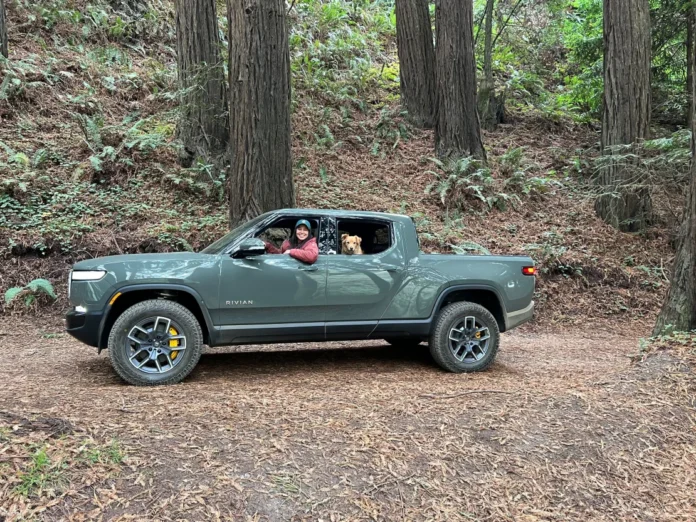Towing worries
Electric motors have distinct advantages when it comes to towing camper trailers. They can pull strongly at low or high speeds, without straining or needing to shift gears. “I’m not constantly sitting there watching transmission temps climb, I’m not watching motor temps climb on hills, and we live in the [Texas] Hill Country,” said Matt Linn, who goes camping with his Ford F-150 Lightning and a camper trailer every few weeks. One major concern campers share when towing with an EV, of course, is range. Any vehicle – whether powered by gasoline, diesel fuel, or electricity – will lose significant driving range between refills when towing a trailer. But liquid fuel tanks are quicker to refill than battery packs and pumps are easier to find than chargers (Valdes-Dapena, 2024).
Plugging in
Charging can also be a major issue, both at campsites and on the road. When he gets to a campsite, Linn said he plugs into the same power outlets that are usually used to provide household power to run lights and small appliances in trailers and RVs. It’s a controversial move since, technically, those power pedestals aren’t generally designed to charge EVs. Linn said he always asks the campground operator and, so far, has never been declined but he can see why it could become an issue. “If they’re at 90% capacity and all of a sudden there’s 15 or 20 EV trucks that roll in you could be exceeding the campground’s capacity,” he said. “So, I think that’s a challenge for campground operators that they’re going to have to address (Valdes-Dapena, 2024).”
Powering the campsite
One nice thing about EVs, though, is that they also bring power with them thanks to their hefty batteries. An F-150 Lightning truck, for instance, has 11 power outlets including those in the bed of the truck and in the “frunk” – or front trunk – under the hood. “We use the frunk almost as an outdoor kitchen because it takes a lot of electrical strain off of the camper to be able to run coffeemakers and ice makers in the frunk,” Linn said. And he can do it without having to fire up a gas-powered generator, which keeps the campsite a little quieter. “As more people switch to EVs and go camping and explore, those spaces don’t have to have as much noise pollution,” said Rivian’s Elsinger, who likes to go camping in her own R1T pickup (Valdes-Dapena, 2024).
Analysis
This article is beneficial for me to learn how electric vehicles are changing the camping culture. Some positive impacts and features that EVs bring to camping are fascinating. The strong towing performance provides sturdy and dependable pulling power at low and high speeds without need of switching gears. EVs also operate more quietly compared to traditional vehicles, which can reduce the noise pollution at camping sites and enhance the overall camping experience. Charging outlets that come with most of the EVs provide campers convenience and reduce gas-powered products. While I also noticed some challenges discussed in the article. The range is one of the biggest concerns for most of the campers, especially when pulling heavy trailers. The other challenge is the lack of charging spots at current campgrounds. With EVs becoming more popular, there should be more camping sites with the charging stations. Overall, this article helps me understand the campers opinion on EVs more and some possible ways EVs can enhance the camping experience.
Reference:
Valdes-Dapena, P. (2024, March 31). Electric vehicles are changing how america goes camping | CNN business. CNN. https://www.cnn.com/2024/03/31/business/electric-vehicles-are-changing-how-america-goes-camping/index.html




